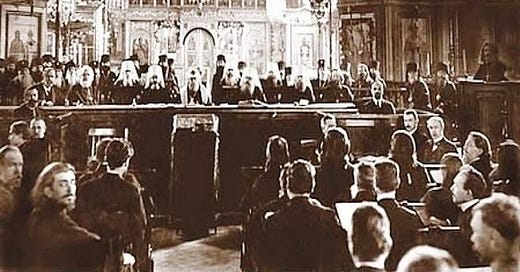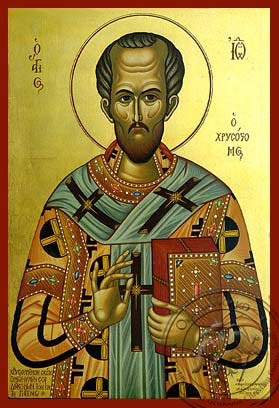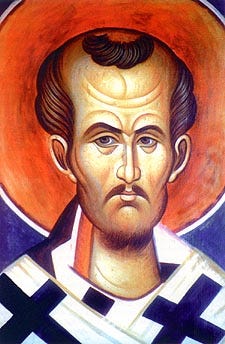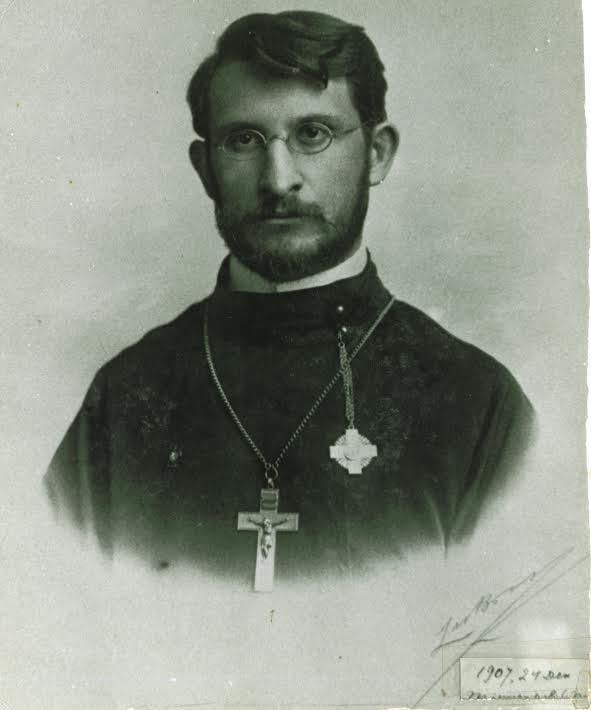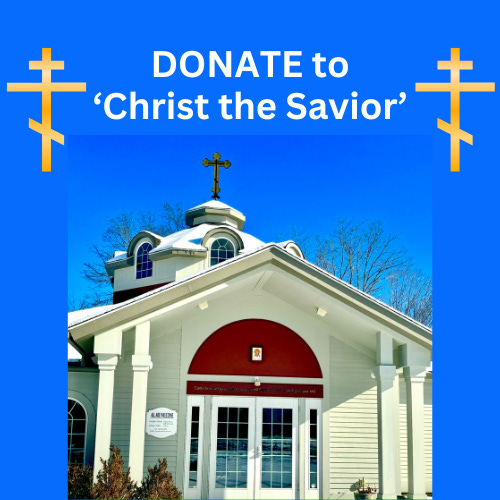“The love of husband and wife is the force that welds society together. Men will take up arms and even sacrifice their lives for the sake of this love. St. Paul would not speak so earnestly about this subject without serious reason; why else would he say, “Wives, be subject to your husbands, as to the Lord?” Because when harmony prevails, the children are raised well, the household is kept in order, and neighbors, friends, and relatives praise the result. Great benefits, both of families and states, are thus produced. When it is otherwise, however, everything is thrown into confusion and turned upside-down.”
+ St. John Chrysostom, Homily 20, Homilies on Ephesians
Daily Scripture Readings
Colossians 1:18-23 (Epistle)
18 And He is the head of the body, the church, who is the beginning, the firstborn from the dead, that in all things He may have the preeminence.
19 For it pleased the Father that in Him all the fullness should dwell,
20 and by Him to reconcile all things to Himself, by Him, whether things on earth or things in heaven, having made peace through the blood of His cross.
21 And you, who once were alienated and enemies in your mind by wicked works, yet now He has reconciled
22 in the body of His flesh through death, to present you holy, and blameless, and above reproach in His sight –
23 if indeed you continue in the faith, grounded and steadfast, and are not moved away from the hope of the gospel which you heard, which was preached to every creature under heaven, of which I, Paul, became a minister.
John 10:9-16 (Gospel, St. John Chrysostom)
9 I am the door. If anyone enters by Me, he will be saved, and will go in and out and find pasture.
10 The thief does not come except to steal, and to kill, and to destroy. I have come that they may have life, and that they may have it more abundantly.
11 I am the good shepherd. The good shepherd gives His life for the sheep.
12 But a hireling, he who is not the shepherd, one who does not own the sheep, sees the wolf coming and leaves the sheep and flees; and the wolf catches the sheep and scatters them.
13 The hireling flees because he is a hireling and does not care about the sheep.
14 I am the good shepherd; and I know My sheep, and am known by My own.
15 As the Father knows Me, even so I know the Father; and I lay down My life for the sheep.
16 And other sheep I have which are not of this fold; them also I must bring, and they will hear My voice; and there will be one flock and one shepherd.
St. John Chrysostom, Archbishop of Constantinople (407)
Saint John Chrysostom, Archbishop of Constantinople, one of the Three Hierarchs [January 30], was born at Antioch in about the year 347 into the family of a military commander. His father, Secundus, died soon after the birth of his son. His mother, Anthusa, widowed at twenty years of age, did not seek to remarry but rather devoted all her efforts to the raising of her son in Christian piety. The youth studied under the finest philosophers and rhetoricians. But, scorning the vain disciplines of pagan knowledge, the future hierarch turned himself to the profound study of Holy Scripture and prayerful contemplation. Saint Meletius, Bishop of Antioch (February 12), loved John like a son, guided him in the Faith, and in the year 367 baptized him.
After three years John was tonsured as a Reader. When Saint Meletius had been sent into exile by the emperor Valens in the year 372, John and Theodore (afterwards Bishop of Mopsuestia) studied under the experienced instructors of ascetic life, the presbyters Flavian and Diodorus of Tarsus. The highly refined Diodorus had particular influence upon the youth. When John’s mother died, he embraced monasticism, which he called the “true philosophy.” Soon John and his friend Basil were being considered as candidates for the episcopal office, and they decided to withdraw into the wilderness to avoid this. While Saint John avoided the episcopal rank out of humility, he secretly assisted in Basil’s consecration.
During this period Saint John wrote his “Six Discourses on the Priesthood,” a great work of Orthodox pastoral theology. The saint spent four years struggling in the wilderness, living the ascetic life under the guidance of an experienced spiritual guide. And here he wrote three books entitled, “Against the Opponents of Those Attracted to the Monastic Life”, and a collection entitled, “A Comparison of the Monk with the Emperor” (also known as “Comparison of Imperial Power, Wealth and Eminence, with the True and Christian Wisdom-Loving Monastic Life”), both works which are marked by a profound reflection of the worthiness of the monastic vocation.
For two years, the saint lived in a cave in complete silence, but was obliged to return to Antioch to recover his health. Saint Meletius, the Bishop of Antioch, ordained him deacon in the year 381. The following years were devoted to work on new theological writings: “Concerning Providence” (“To the Ascetic Stagirios”), “Book Concerning Virginity,” “To a Young Widow” (2 discourses), and the “Book of Saint Babylos, and Against Julian and the Pagans.”
In the year 386 Saint John was ordained presbyter by Bishop Flavian of Antioch. Saint John was a splendid preacher, and his inspired words earned him the name “Golden-Mouthed” (“Chrysostom”). For twelve years the saint preached in church, usually twice a week, but sometimes daily, deeply stirring the hearts of his listeners.
1917-18 Diaries of Metropolitan Leonty Published in Russia
The newly-published diaries of Metropolitan Leonty (Archpriest Leonid Turkevich at the time) provide a first-hand account of proceedings of the historic Moscow Church Council of 1917-18 and a dramatic chronicle of his time in Russia in the throes of Revolutionary conflict and his long, treacherous and arduous travel back to America through Siberia and Japan.
Metropolitan Leonty was a luminary of North American Orthodoxy in the 20th century, whose ministry as priest and bishop in America for nearly six decades culminated with his tenure as Primate of the Russian Metropolia (precursor of the Orthodox Church in America) during the last 15 years of his long life. In him could be found the lived experience of the continuity of the North American Church from the tenure of Saint Tikhon as Archbishop of North America through the tumultuous time of the 1917 Russian Revolution and its aftermath for the Church in North America to the very eve of the granting of autocephaly to the Orthodox Church in America. For Metropolitan Leonty, the Church’s Councils - where hierarchs, clergy and laity gather to deliberate and decide the most crucial issues - were a cornerstone of church life. In a sense, Metropolitan Leonty was the very embodiment of conciliar experience as a participant in nearly a dozen All-American Sobors, presiding over four of them, and as a delegate from the Diocese of North America at the landmark All-Russian Church Council in Moscow in 1917-18, where he actively contributed to the proceedings.
Among the many issues before the Moscow Council was the fundamental question of the restoration of the Patriarchate, a question that provoked intense and passionate debate. In the course of this deliberation, Fr. Leonid delivered a speech in which he argued vehemently in support of the restoration of the Patriarchal system of church governance. His arguments were based on his experience in North America that the Russian Church’s missionary efforts abroad were being hindered by the general perception that the Church’s ties to the Russian state and the state’s political goals were too strong. He advocated for a Patriarch at the head of the Church who would ensure the ecclesial character of the Church’s mission and thereby enhance the Church’s authority. The call to restore the Patriarchate prevailed and Saint Tikhon was elected as the first Patriarch of the Russian Church in two centuries.
This week’s calendar reminders:
Monday 11/11: Matins 8:30 a.m.
Tuesday 11/12: no services or events
Wednesday 11/13: no services or events
Thursday 11/14: Matins 8:30 a.m.; Men’s Group 7pm
Friday 11/15: Matins 8:30 a.m.
Saturday 11/16: Choir Workshop 4-6 pm; Catechumen class 4:30; Great Vespers 6pm
Sunday 11/17: Divine Liturgy 9: 15 a.m.


